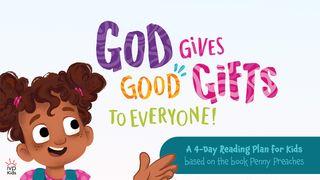God Has a NameSample

Yet He Does Not Leave the Guilty Unpunished
I know what you’re thinking.
The closing line about how Yahweh “punishes the children and their children for the sin of the parents”—what’s up with that?
The opening line of the closing line is “maintaining love to thousands . . .” The idea here is the scope of Yahweh’s hesed. It’s not just for a few of his favorites—it’s limitless.
Next, Yahweh says that he is “forgiving wickedness, rebellion and sin . . .” The Hebrew word translated as “forgiving” literally means “to lift up,” “to carry,” or "to take away." Talk about a signpost pointing forward to Jesus. Not to get ahead of myself, but that’s exactly what he does on the cross.
But there’s a counterpoint to the forgiving nature of God:
“Yet he does not leave the guilty unpunished . . .”
Another translation gets us a little closer to the original Hebrew: “but who will by no means clear the guilty.” The idea here is that Yahweh is forgiving by nature, but at the same time, he’s also just. He doesn’t let the guilty off the hook.
And Yahweh’s justice is a good thing. God’s end goal is a world with no evil. His justice is about the healing and renewal of the world. That’s why it’s flexible. He’s highly sensitive to any change of direction. When we repent, he responds. With mercy. But if we don’t repent, then he’ll only wait for so long before he puts a stop to our rampage.
Unfortunately, you’re still thinking, Yes, great, but what about how Yahweh punishes kids?
That’s the next, unsettling line:
“he punishes the children and their children for the sin of the parents . . .”
What could this possibly mean?
Well, for starters, it can’t mean what it sounds like at face value. Here’s why: Moses later makes the exact opposite point: “Parents are not to be put to death for their children, nor children put to death for their parents; each will die for their own sin.”
There are layers of meaning to the text.
The first layer is that the parents’ sin has consequences for the children’s future. If Dad and Mom run a meth lab and are arrested by the police and land in jail, it’s the children who will suffer the most.
The next layer of meaning is that sin runs in the family. Sin, like your DNA, is passed down through your family. One generation’s sin often becomes the next generation’s sin, and the next, and the next.
All of which leads me to the last layer: because Yahweh is just, he will continue to punish sin in each and every generation until it’s completely gone.
But the last phrase is my favorite part:
“to the third and fourth generation.”
The word "generation" was added for English readers to make sense of an awkward Hebrew idiom. Scholars argue that whatever word comes after “thousands” may also come after “to the third and fourth.” So it could read:
“maintaining love to thousands . . .
and
he punishes the children to the third and fourth.” You see the picture?
Imagine a scale in your mind’s eye. On one side is Yahweh’s mercy. On the other is God’s justice. But they are way out of balance. The imagery here is of a scale that’s weighted to the side of mercy. He punishes to the third and fourth, yes, but he’s “maintaining love to thousands.”
And there’s a tension here between mercy and justice—a tension that goes back a very long time. You feel it on every page of the Bible. As the story goes on, you start to think, How is God going to resolve this?
And the resolution finally comes in a rabbi from Nazareth named Jesus.
At Jesus's death on the cross, we see—more clearly than ever before—what Yahweh is like. The reconciliation of God’s mercy and justice in the death of Jesus is the ultimate expression of God’s character. The tension between mercy and justice is finally resolved. It’s in God’s nature to show mercy and forgive, but it’s also in his nature to deal with sin, and these two parts of God’s person—seemingly at odds for so many years—finally come together on the cross in beautiful harmony.
This is what God is like. Yes, he gets angry, but he takes that anger on himself. He doesn’t make you and me pay for our sin—he pays for it. With the currency of his own blood.
So this closing line of Exodus 34 is both hope and a warning.
The warning is this: Yahweh will deal with sin in our lives, one way or another. We might not take sin all that seriously, but he does. To the point of death—literally. Sin is incredibly cruel. And when we sin, we often lose blessing irretrievably.
But it’s even more true that Yahweh is compassionate and gracious, slow to anger, abounding in love and faithfulness, and forgiving of every sin imaginable.
About this Plan

What is God like? This plan, from John Mark Comer and Practicing the Way and based on the book God Has a Name, covers in depth the most quoted verse in the Bible by the Bible - Exodus 34v6-7 - showing us the most essential aspects of God's character and what that means for us. The second edition of God Has a Name is available now, with updated content. Find it wherever books are sold.
More
We would like to thank John Mark Comer Teachings Practicing the Way for providing this plan. For more information, please visit: https://practicingtheway.org
Related Plans

God Gives Good Gifts to Everyone

Pawprints & Prayers: Devotions for Dog Lovers

Living With a Strong-Willed Child

Acts Reading Plan

When God Says No!

See God’s Peace: 3 Days of Visio Divina

The Journey of Yes

The Last Half Hour: When Waiting Becomes Glory

Dog Dad Devotions on Leadership, Loyalty and Love
